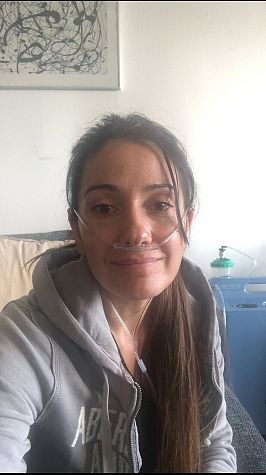A growing number of COVID-19 survivors say they have continued to have symptoms for months. It's one of the emerging mysteries behind the novel coronavirus.
Several survivors of COVID-19 say they have continued to suffer from symptoms of the virus weeks and months after first contracting it.
 ADVERTISEMENT
ADVERTISEMENT
 ADVERTISEMENT
ADVERTISEMENT
It's one of the emerging mysteries of this new virus, which has travelled the world and killed more than 570,000 people.
Some survivors now find themselves seeking help online from others experiencing similar complications due to coronavirus which they fear could leave them with chronic health issues.
"We feel completely abandoned," said 36-year-old entrepreneur Genevieve Danesi from Antibes, France, who maintains that doctors repeatedly failed to take her seriously when she sought help for her symptoms.
It wasn't until a month after those symptoms first emerged that she was admitted to hospital for a CT scan which showed clinically that she likely had COVID-19. Even after the first month, she continued to have symptoms, unable to stand upright for more than five minutes with a racing heartbeat and vertigo.
Before the pandemic, Danesi was in excellent health. She went to the doctor once a year, was very active, working out twice a day, and doesn't smoke.
Danesi says she was consistently told that because she was young and wouldn't die she should stay at home, but she says her health continued to deteriorate.
"From the beginning up until day 70, it was like a yo-yo of relapses and new symptoms. It was like Russian Roulette every morning," Danesi said. It wasn't until a doctor put her on oxygen treatment at home, months after her first symptoms appeared, that she began to feel better.
But she still needs to take aspirin daily to prevent her resting heart rate from climbing to 120 beats per minute, she says.
A study in Italy released last week found that out of 143 COVID-19 patients released from hospital more than 87% said they had least one symptom that persisted after testing negative, most often fatigue and shortness of breath.
The study called for continued monitoring of patients after discharge from hospital due to the small study size and lack of control group. There are larger studies ongoing researching what experts say is likely a proportion of patients who experience persistent symptoms.
'Chronic COVID'
"Research studies are only just starting to emerge on documentation of different manifestations of ‘Chronic COVID’ or ‘Long-COVID’," said Danny Altmann, a professor of immunology at Imperial College London.
"The terribly diverse manifestations may have quite diverse mechanisms," Altmann added, meaning it could be that even people with mild symptoms have lasting tissue damage or an immune reaction that is ongoing almost as a syndrome.
"What we do know is that there are a certain number of people who contract the virus sometimes with severe forms, sometimes with less severe forms and who have symptoms for weeks," France's health minister Olivier Véran said in a television interview.
UK Health Secretary Matt Hancock told Sky News on Wednesday that he was "concerned there's increasing evidence a minority of people - but a significant minority - have long-term impacts and it can be quite debilitating."
He added that the government has invested almost £10m (11.03 million euros) into research regarding long-term effects.
Véran said that there was research ongoing looking at whether a lasting "inflammatory phase" of the virus could explain these symptoms, but explained that they were looking at ways to help these patients.
But at the moment, they don't have many answers.
Claudia Uceda, a 24-year-old translator based in Paris, has been to Accident and Emergency (A&E) with several asthma attacks since recovering from coronavirus.
She started having trouble breathing in March but was not admitted to hospital even when her entire family came down with the virus.
A doctor did not check her lungs until after France's lockdown in May, finding lesions consistent with pneumonia and reduced lung capacity.
"It was hard to prove that I was really sick. So not only did I feel bad, but I was sort of isolated," she told Euronews. In France, many of the people who say they still have symptoms of coronavirus first came down with the disease at the height of the epidemic and were therefore unable to get a test.
Nathalie Nury says she first came down with fever, chest pain, shortness of breath, and extreme fatigue on March 24.
The 51-year-old visual arts teacher in Nîmes and says her son and his girlfriend had recently come back from Paris and they had lost their sense of smell and taste.
Her symptoms lasted ten days but she wasn't tested because tests were reserved for hospitalised coronavirus patients and health workers.
Throughout April, she said she still felt tired but it wasn't until the start of May that she came down with a fever and chest pain again.
For months, she has suffered cycles of renewed symptoms from intense chest pain to vertigo.
"I was totally lost. My loved ones did not understand," Nury said. She's seen multiple doctors, some of whom did not take her symptoms seriously.
She has now taken to social media. In France, a hashtag translating to "after day 20" or "after day 100" is helping those who say they still suffer to find support for a condition she finds difficult and isolating. The support network "showed me that I wasn't an isolated case and that other people had similar symptoms."
"I think this is one of the very hard aspects: many of the people who feel long-term unwell have never had a PCR test and never been hospitalised. So some doctors may feel they’re just anxious," said Altmann at Imperial College London.
"Even if people had clear symptoms, some doctors may comment 'for any serious infection you may take a while to recover'."
"However, there are many infections that leave behind specific disease profiles that can be chronic. For a proportion of COVID-19 patients, that seems likely," he added, explaining that several studies are underway to look at these patient profiles.













